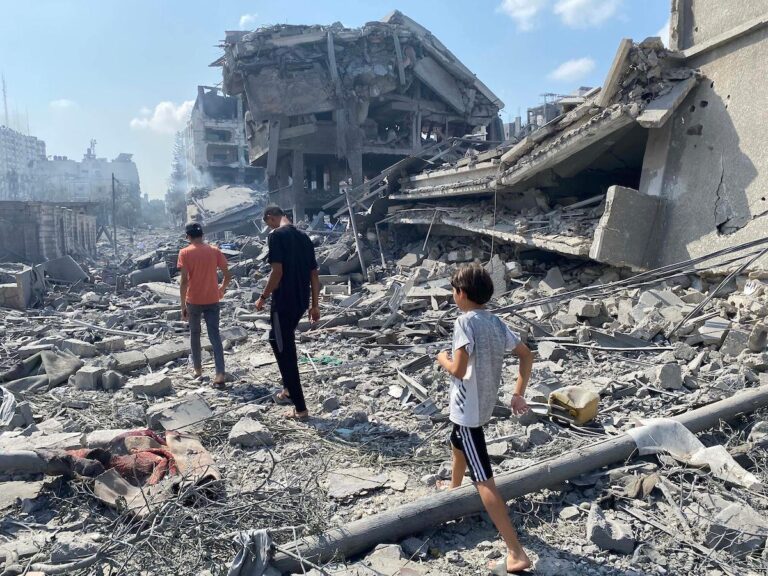US Involvement in Gaza Conflict: Legal and Ethical Dimensions
The escalating violence in Gaza has brought renewed attention to the United States’ military support for Israel, with Human Rights Watch issuing a critical report that raises serious legal and ethical questions. The organization warns that US military aid‚ÄĒincluding arms transfers and intelligence cooperation‚ÄĒmay implicate American forces in facilitating alleged war crimes committed by Israeli troops. This scrutiny intensifies the debate over Washington‚Äôs role in the conflict and the imperative for accountability under international humanitarian law.
Central issues highlighted by Human Rights Watch include:
- Legal Accountability: Assessing whether US assistance amounts to direct or indirect involvement in breaches of international humanitarian standards.
- Transparency Deficits: The urgent need for detailed disclosure regarding the scope and application of US military support in Gaza.
- Policy Reconsideration: Calls for reevaluating military aid packages in light of mounting evidence of civilian harm and infrastructure devastation.
| Type of US Military Assistance | Operational Impact | Human Rights Watch Concerns |
|---|---|---|
| Arms Transfers | Deployment of weapons in conflict zones | Facilitation of precision attacks resulting in civilian casualties |
| Intelligence Collaboration | Identification and targeting of locations | Potential contribution to unlawful targeting practices |
| Military Training Programs | Development of combat tactics | Possible support for operations violating international law |
Comprehensive Allegations of Israeli War Crimes in Gaza
Human Rights Watch’s latest investigation presents a detailed account of alleged war crimes by Israeli forces in Gaza. The report documents numerous instances of unlawful airstrikes, disproportionate use of force, and civilian deaths that contravene international humanitarian law. It highlights the widespread destruction of essential civilian infrastructure, including medical facilities, educational institutions, and residential neighborhoods, exacerbating the humanitarian crisis faced by Gaza’s population. Satellite imagery and firsthand witness accounts substantiate claims of indiscriminate bombings causing extensive civilian harm.
The report also scrutinizes the United States’ involvement, suggesting that American military support may legally implicate US forces in these violations. Key points include:
- Supply of advanced weaponry utilized in operations linked to alleged war crimes
- Provision of real-time intelligence enabling targeted airstrikes
- Insufficient enforcement of accountability measures regarding Israeli military conduct
| Alleged Violation | Supporting Evidence | Possible US Role |
|---|---|---|
| Indiscriminate Aerial Bombardment | Satellite Data & Eyewitness Reports | Provision of Targeting Intelligence |
| Civilian Deaths | Medical Documentation | Transfer of Military Hardware |
| Destruction of Healthcare Facilities | On-site Assessments | Operational Coordination Support |
International Legal Responsibilities of US Forces
The participation of US forces in supporting Israeli military operations in Gaza raises profound legal questions under international human rights frameworks. Legal scholars and human rights advocates argue that if US personnel knowingly provide substantial assistance‚ÄĒsuch as intelligence, logistical aid, or weaponry‚ÄĒthat facilitates violations of international humanitarian law, they could be held legally accountable. This includes potential complicity in war crimes under the Rome Statute of the International Criminal Court, which, while the US has a complex relationship with, still sets important international legal standards.
US forces are bound by several critical obligations under international law, including:
- Due Diligence: Ensuring that military support does not enable unlawful targeting of civilians or disproportionate force.
- Prevention and Reporting: Implementing proactive measures to prevent violations and reporting credible allegations of abuses.
- Accountability: Cooperating with independent investigations and enforcing responsibility within military command structures.
| Legal Concept | Significance | US Obligations |
|---|---|---|
| Complicity | Liability for aiding unlawful acts | High if support is knowingly provided |
| Command Responsibility | Accountability of military leadership | Applies to US commanders involved |
| Human Rights Compliance | Duty to protect civilian populations | Mandatory under US and international law |
Advocating for Reform: Enhancing Oversight of US Military Aid to Israel
The revelations from Human Rights Watch have galvanized calls from legislators, human rights organizations, and civil society for a thorough reassessment of US military assistance to Israel. Critics warn that without stringent oversight, continued aid risks entangling US personnel in potential breaches of international humanitarian law. Advocates stress that current monitoring systems lack sufficient transparency and fail to guarantee that US-supplied resources are not employed in actions constituting war crimes.
Key demands for policy reform include:
- Implementation of robust tracking mechanisms to monitor the deployment of US military aid.
- Strengthening accountability frameworks to investigate and address allegations of human rights violations linked to US support.
- Legislative initiatives aimed at conditioning aid on verifiable compliance with international legal standards.
| Focus Area | Recommended Reform |
|---|---|
| Transparency | Mandatory public disclosure of aid utilization |
| Accountability | Independent probes into war crime allegations |
| Legal Oversight | Enhanced review processes linking aid to compliance with international law |
Conclusion: Pathways to Accountability and Ethical Engagement
As the Gaza conflict continues to attract global attention, the Human Rights Watch report underscores the intricate legal and moral responsibilities facing the United States in its military partnership with Israel. The possibility that US forces could be complicit in violations of international law amplifies the urgency for transparent oversight and robust accountability mechanisms governing military aid. This evolving situation highlights the broader challenges confronting global powers involved in conflict zones, where legal obligations and ethical considerations must guide international engagement.







